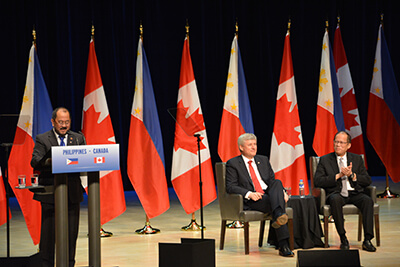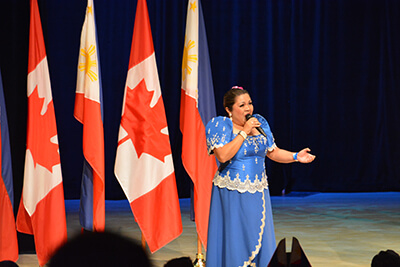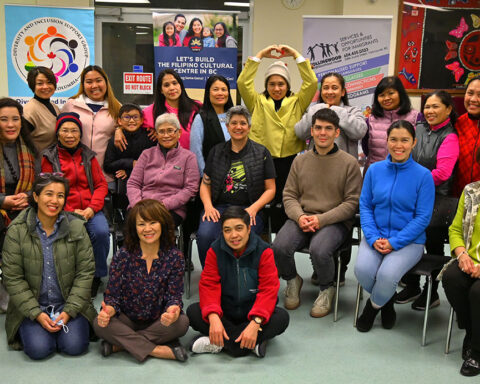If Friday’s state visit of Philippine President Benigno S. Aquino III was any indication of the Harper government’s political orchestration in obtaining votes from the Filipino-Canadian community, then it’s safe to say that winning over Filipinos in the upcoming federal elections won’t be an easy feat.
Kababayans (Filipino word for countrymen) across the Greater Toronto Area flocked to Roy Thomson Hall to show their support and excitement to meet the Filipino leader. Some men donned the traditional barong, and some women were dressed in Filipiniana iconic butterfly-sleeved gowns. It was the first visit of Aquino and the first by a Filipino president since 2002 with the visit of then president Gloria Arroyo.
But in the periphery, there was also a group of other Filipino organizations that rallied outside. Jesson Reyes, a spokesperson from Migrante Canada said that they are ultimately calling for Aquino’s resignation because of his dismal record in protecting Overseas Filipino Workers (OFWs) like Mary Jane Veloso and failing to address the extrajudicial killings and forced disappearances rampant in the country, among other issues.
As the two national anthems were sung one after the other, Filipino-Canadians experienced that feeling of duality – of loving both their motherland and now their adopted country Canada.
Though the three-day state visit of Aquino was clearly divisive, it was still a rare occasion to celebrate and witness. He arrived in Toronto, home to Canada’s largest Filipino community, on the second of his three-day visit.
 Philippines-born Senator Tobias Enverga Jr. (pictured to the right) was the evening’s emcee; he introduced Prime Minister Stephen Harper to the stage, shortly followed by President Aquino. Both leaders received standing ovations, applause and cheers from the crowd, as waves of small Philippine flags broke out from the audience.
Philippines-born Senator Tobias Enverga Jr. (pictured to the right) was the evening’s emcee; he introduced Prime Minister Stephen Harper to the stage, shortly followed by President Aquino. Both leaders received standing ovations, applause and cheers from the crowd, as waves of small Philippine flags broke out from the audience.
“I’m excited to hear his speech,” Art Viola, the nostalgic former Lord Mayor of Niagara-on-the-Lake expressed. “When his mother came to visit Toronto, I was also invited. A couple of people from Niagara Falls attended the dinner. So it was double excitement. I was really surprised to see him here; I just got the invitation last night. It was very informative and positive.”
An electric mix of excitement, nationalism, pride and unity hung in the air, as both leaders took to the expansive stage that was adorned with Canadian and Philippine flags.
As the two national anthems were sung one after the other, Filipino-Canadians experienced that feeling of duality – of loving both their motherland and now their adopted country Canada.
Other dignitaries and officials were present; Harper was backed up by some of his Cabinet officials including Finance Minister Joe Oliver, and barong-clad Defence Minister Jason Kenney. Toronto Mayor, John Tory, was also in attendance.
Positives in Bilateral Relationship
In his speech, President Aquino respectfully told the Prime Minister that in this rare occasion to meet with fellow Filipinos, he’d like to deliver his remarks in Tagalog, to which Harper then intermittently put headphones into his ears for translation.
President Aquino humbly boasted about the reforms and progress made under his administration, from infrastructure/road projects, boom in coconut water exports, updates on procuring second-hand fighter jets, and his steady fight against corruption. Mostly, his remarks highlighted economic growth in the country.
“[I]t’s wonderful that a Philippine leader can actually come and visit Filipinos who are overseas and give some good, positive report in what’s happening in our country. It is wonderful that the people-to-people relationship is already there. Now we can mutually develop the trade relationship.” – Julius Tiangson, Member of Parliament candidate
“Bigyan mo lang nang isang pagkakataon, ay talagang magpapakitang gilas ang Pilipino,” Aquino said, which translates to, “Just give him one chance, and the Filipino will surely show his prowess.”
He continued stating that what the Philippines had accomplished economically was “no joke”. “Let’s peek at the economy, formerly Sick Man of Asia, now tagged Darling of Asia. We achieved the all-time high foreign direct investments of $6.2 billion in 2014. From 2010 to 2014, we had an average GDP growth of 6.3 per cent,” he noted, garnering applause from the audience.
The President added that this year’s target would be seven to eight per cent GDP growth.
“This is a very significant visit here, one of the largest Filipino populations is here in Canada,” said Julius Tiangson, officially nominated Conservative Member of Parliament (MP) candidate for Mississauga Centre riding.
“It’s a good report and it’s wonderful that a Philippine leader can actually come and visit Filipinos who are overseas and give some good, positive report in what’s happening in our country. It is wonderful that the people-to-people relationship is already there. Now we can mutually develop the trade relationship.”
The visit is not only a reciprocal gesture from Harper’s official trip to the Philippines back in November 2012. This time around, the two countries engaged in discussions over free trade agreements, regional and global security challenges, and Canada’s foreign aid, in a move to further strengthen bilateral ties.
“Filipinos are smart, they’re intelligent people, we know what the story is, it’s going to be difficult to pull a fast one over us.” – Rafael Fabregas, immigration lawyer
“We are starting negotiations on a FIPA (Foreign Investment Promotion and Protection Agreement) and we are going to start on a preliminary basis having a free-trade agreement,” said Finance Minister Oliver. “We already have a FIPA, we need to modernize it. We just want to broaden trade in all areas.”
 Important Issues Overlooked
Important Issues Overlooked
It wasn’t all pride and glory though. While those present could appreciate the moment, some were critical.
“You know what, if it walks like a duck, it talks like a duck, it’s probably a duck,” immigration lawyer and advocate for the live-in caregivers program, Rafael Fabregas, commented. “There were definitely elements of a political rally, but the people who are sitting around me, who didn’t know who I am and what my background is, they were cognizant of that, they picked up on it.”
Fabregas said he heard comments like, ‘Ano ba to? (What is this?) Rally ba ito or speech ni PNoy? (Is this a rally or speech of PNoy (Aquino)?)’ from audience members. “Filipinos are smart, they’re intelligent people, we know what the story is, it’s going to be difficult to pull a fast one over us,” he added.
Still, he had some positive observations.
“I think it was a very engaging speech, a lot of information,” Fabregas added. “I was looking forward to hear more about what’s going on in the Philippines. It was nice to hear him acknowledge the contributions made by the Filipino-Canadians, through the betterment of our country. At yun naman yung talaga ang gusto natin right? (Isn’t that what we want?) We always want to give back to our motherland.”
“I was a bit disappointed because I thought that he came here for that purpose. You know to bail out our TFWs from going home and applying again in four years, which is unnecessary. And most of the jobs of TFWs, the Canadians don’t even want to take it.” – Ladies of the Knights of Rizal member
Others showed some disappointment.
The more contentious issues, like the plight of Temporary Foreign Workers (TFW), were left out, or simply contained. Reports have stated that Aquino and Harper made a deal on the TFW program, but details of that have not been released.
A member of the Ladies of the Knights of Rizal voiced out, “I was a bit disappointed because I thought that he came here for that purpose. You know to bail out our TFWs from going home and applying again in four years, which is unnecessary. And most of the jobs of TFWs, the Canadians don’t even want to take it. That’s why they were hired in the first place, from the Philippines. They don’t want to do the jobs that the Filipinos are willing to do,” she said.
When The Philippine Reporter broached the subject with Minister Kenney, and asked if the TFW subject was raised between the two leaders, he replied: “It was only raised briefly, and I think both Prime Minister and President Aquino agreed that we want to protect the rights of contract workers, of temporary foreign workers.”
“Of course, we Canadians have to ensure that Canadians, immigrants, and citizens, have the first available access to available jobs,” he continued. “We don’t want to end up with permanent people who are on temporary status, which is why we have increased pathways to permanent residency and citizenship for TFWs and also put in a limit to how long those who don’t get permanent residency stay in Canada.”
“The number of Filipinos [immigrating] to Canada with permanent residency has doubled since our government came to office. It has increased by over 100 per cent.” – Defence Minister Jason Kenney
When further pressed about the negative implications for migrant workers in relation to the Four-in/Four-Out rule that took effect early this year, he said: “The number of Filipinos [immigrating] to Canada with permanent residency has doubled since our government came to office. It has increased by over 100 per cent. It has gone from annual average of about 16,000 Filipino permanent residents’ immigration to Canada prior to 2006 to about 28,000 on average now.”
He continued: “So that’s largely because of the huge increase in the number of temporary foreign workers who can now access permanent residency through the Canadian experience class and, of course, the expanded live-in caregiver program, as well as the new Express Entry program. Obviously we are much more generous than before, but there are obviously going to be limits and anyone who comes here on a work permit knows full well that there’s no guarantee they’ll get permanent residency. So there’s got to be a balance.”
Filipinos are Philippines Greatest Resource
Yet like it or not, Filipinos are creating a niche for themselves beyond the common stereotype as caregivers or health-care professionals. There’s a surge in the community where Filipinos are now working to serve as political leaders, entrepreneurs, creative designers, activists, journalists and so forth.
Harper eloquently greeted the masses with “Bonsoir, Good evening, Magandang Gabi,” but it was his remarks later on that were foretelling: “Ladies and gentlemen, I think the President Aquino put it well when he said, and I quote, ‘The Philippines is blessed with the greatest resource. It’s people, who are hardworking, very loyal, and very adaptable . . .’ and I would add, love for family and commitment to faith. Filipino-Canadians have become an integral part of every single aspect of Canadians today,” he said.
And he’s right. Kababayans are no longer just sitting there waiting on the sidelines.
Published in partnership with The Philippine Reporter.




